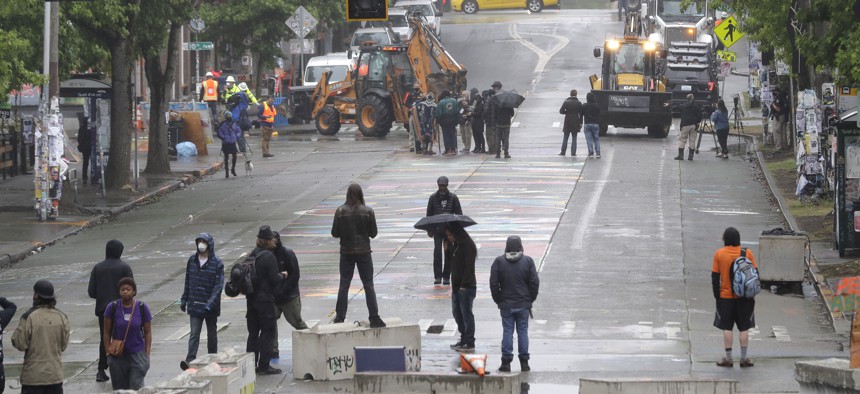Justice Department Dubs New York, Seattle, and Portland as ‘Anarchist Jurisdictions’

Protesters stand on barricades a block away as Seattle Department of Transportation workers remove other barricades Tuesday, June 30, 2020 at the CHOP (Capitol Hill Occupied Protest) zone in Seattle. AP Photo/Ted S. Warren
The three cities were flagged for “permitting anarchy, violence and destruction” as part of the Trump administration’s bid to cut funding to cities where recent protests over racial injustice and police brutality have occurred.
The Department of Justice on Monday named three U.S. cities—New York, Seattle, and Portland—as “anarchist jurisdictions” in President Trump’s bid to block them from receiving federal grants.
Citing specific violent incidents in each city and budget cuts local leaders made to police departments, the Attorney General William Barr called on city leaders to “become serious about performing the basic function of government and start protecting their own citizens.”
Trump announced earlier this month he was looking at ways to reduce federal funding to cities led by Democrats where widespread protests against police brutality and racial injustice have taken place. Under that order, the Office of Management and Budget was told to review what federal grants could be restricted.
Legal experts have critiqued the move as political strategy rather than actual policy, noting how difficult it would be for the administration to legally justify restrictions on specific grant funding in this manner.
New York Mayor Bill de Blasio echoed those criticisms, calling Monday’s announcement “another one of President Trump’s games” and all “part of his campaign strategy.”
Cities are likely to respond with legal action if the administration takes steps to withhold federal funding.
“The president does not have the authority to change the will of Congress,” said New York City Corporation Counsel Jim Johnson. “We are preparing to fight this in court if, ultimately, he actually takes concrete steps to withdraw federal funds,” he said.
Seattle Mayor Jenny Durkan called the move “a gross misuse of federal power and blatantly unlawful.”
The three cities and Washington, D.C. were already on notice for the possible designation after the president mentioned them in a memo authorizing the DOJ to identify jurisdictions where officials have “permitted violence and the destruction of property to persist and have refused to undertake reasonable measures.”
Monday’s announcement details a series of events in each of the cities that the DOJ uses as its basis for the designation.
In justifying its decision, the DOJ said shootings have increased in July and August in New York City and cited the city council’s decision to cut $1 billion from the New York Police Department’s fiscal 2021 budget.
In Portland, DOJ cited confrontations between demonstrators and law enforcement during protests, the city council’s $15 million budget cut to the police department, and Mayor Ted Wheeler’s rejection of help from federal law enforcement to contain the protests. The involvement of federal law enforcement stirred outrage in Portland over the summer, when local news outlets reported that federal officers were pulling protesters off the street into unmarked vehicles and detaining them.
In Seattle, DOJ cited the formation of the “Capitol Hill Occupied Protest” zone, a six-block area of the city taken over by protesters over the summer. The CHOP was the site of two fatal shootings and the DOJ said crime rose there while protesters held control of the area and prevented law enforcement and firefighters from entering. After almost a month, Seattle police cleared the area and arrested anyone who refused to leave.
“When state and local leaders impede their own law enforcement officers and agencies from doing their jobs, it endangers innocent citizens who deserve to be protected, including those who are trying to peacefully assemble and protest,” Barr said. “We cannot allow federal tax dollars to be wasted when the safety of the citizenry hangs in the balance.”
Homicides have spiked this year in major cities across the country, but by and large the level of violence remains far lower than in decades past. Police in Portland recorded 15 homicides in July, the most killings in one month going back three decades. In New York, shootings were up 140% between May and August compared to the same time in 2019 and the city has recorded 321 homicides as of Sept. 13 compared to 230 at the same time last year. In Seattle, 29 homicides have been reported through August compared to 28 last year.
But compared to other major U.S. cities, all three cities boast low homicide rates. For example, all three had homicide rates of less than 4 murders per 100,000 people in 2016, compared to cities like Baltimore where there were 51 murders per 100,000 people.
Barr has taken a hard line when cracking down on violent demonstrators, urging U.S. attorneys to seek federal charges whenever possible and to consider bringing up some on charges of plotting to overthrow the U.S. government, the Wall Street Journal reported. The Justice Department has also contemplated whether prosecutors could bring criminal charges against the Seattle mayor for allowing residents to take control of the CHOP area, the New York Times reported.
Durkan at the time slammed that suggestion as tyrannical. "The DOJ cannot become a political weapon operated at the behest of the President to target those who have spoken out against his actions. That is an act of tyranny, not of democracy," she said in a statement.
Trump previously sought to restrict grant funding for jurisdictions that did not cooperate with federal immigration officials. But the administration has had difficulty defending Trump’s “sanctuary city” order in court. Three of four federal appellate courts ruled against the order.
Other cities could be added to the DOJ’s list of “anarchist” jurisdictions, the department said.
Andrea Noble is a staff correspondent with Route Fifty.
NEXT STORY: Racial Justice Push Creates Momentum to Protect Black-Owned Land





